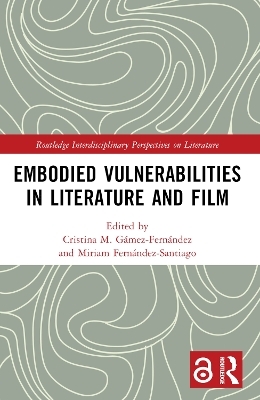
Embodied VulnerAbilities in Literature and Film
Routledge (Verlag)
978-1-032-23142-6 (ISBN)
- Lieferbar (Termin unbekannt)
- Versandkostenfrei innerhalb Deutschlands
- Auch auf Rechnung
- Verfügbarkeit in der Filiale vor Ort prüfen
- Artikel merken
Embodied VulnerAbilities in Literature and Film includes a collection of essays exploring the ways in which recent literary and filmic representations of vulnerability depict embodied forms of vulnerability across languages, media, genres, countries, and traditions in the late 20th and early 21st centuries. The volume gathers 12 chapters penned by scholars from Japan, the USA, Canada, and Spain which look into the representation of vulnerability in human bodies and subjectivities. Not only is the array of genres covered in this volume significant— from narrative, drama, poetry, (auto)documentary, or film— in fiction and nonfiction, but also the varied cultural and linguistic coordinates of the literary and filmic texts scrutinized—from the USA, Canada, Spain, France, the Middle East, to Japan. Readers who decide to open the cover of this volume will benefit from becoming familiar with a relatively old topic— that of vulnerability— from a new perspective, so that they can consider the great potential of this critical concept anew.
Cristina M. Gámez-Fernández is Senior Lecturer of English in the Department of English and German at the University of Córdoba (Spain) and a founding member of the Challenging Precarity network. She has recently co-edited Representing Vulnerabilities in Contemporary Literature (Routledge, 2023). Miriam Fernández-Santiago is Senior Lecturer of English and Head of the English Department at the University of Granada (Spain), where she teaches courses on Literatures and Cultures in English at graduate and undergraduate levels. Her current research interests focus on contemporary literature in English, critical posthumanism, vulnerability, and disability studies.
List of Contributors
Preface: Framing Vulnerable Embodiments as Precarity’s Product
David T. Mitchell
Introduction: An Ecology of Embodied VulnerAbility—Literary and Filmic Representations across the GlobeCristina M. Gámez-Fernández and Miriam Fernández-Santiago
Chapter 1
Vulnerable Masculinity: Emotional Transcendence and the Re-Framing of the Bushidô in Takarazuka Revue’s Performance Strategy
Maria Grajdian
Chapter 2
Norma Desmond and Fedora Performing Vulnerability: Masking Age, Gendering Bodies, Transforming Selves
Marta Miquel-Baldellou
Chapter 3
Vulnerable Motherhood: The Precarious Mother in Unlikely Angel (2005) and Captive (2015)
Miriam Borham-Puyal
Chapter 4
Vulnerable Children: Collective Resistance in Songs My Brothers Taught Me (2015)
Andrés Buesa
Chapter 5
Vulnerability on Contemporary Stage: Embodying Gendered Precarity in Gary Owen’s Iphigenia in Splott (2015) and In the Pipeline (2010)
Susana Nicolás Román
Chapter 6
Poetics of Vulnerability: Stéphane Bouquet and Marie-Claire Bancquart Writing as Exploration of the Limits of Collective and Singular Bodies
Nicholas Hauck
Chapter 7
Vulnerable Encounters: Family Wounds, Illness, and Pain in Yaa Gyasi’s Transcendent Kingdom (2020)
Paula Barba Guerrero
Chapter 8
Vulnerability through the Invulnerable Transhuman Lens: Ethics and Disruption of Emotional Connections and Mental Affections in Maniac (2018)
Ana Chapman
Chapter 9
In Praise of Small Things: Vulnerable (Yet Resilient) Bodies in Madeline Bassnett’s Under the Gamma Camera (2019)
Leonor María Martínez Serrano
Chapter 10
Recognizing Vulnerabilities in Rural Spain: Political and Literary Forms of Resistance
McKew Devitt
Chapter 11
Vulnerability, (In)Hospitable Politics, and Ethical Encounters in The Visitor (2007)
Luisa María González Rodríguez
Chapter 12
Recording One’s Vulnerability: Refugees’ Experiences in the Auto-Documentaries #MyEscape (2016), Chauka Please Tells Us the Time (2017), and Midnight Traveler (2019)
Beatriz Pérez Zapata and Víctor Navarro-Remesal
Index
| Erscheinungsdatum | 05.08.2023 |
|---|---|
| Reihe/Serie | Routledge Interdisciplinary Perspectives on Literature |
| Verlagsort | London |
| Sprache | englisch |
| Maße | 152 x 229 mm |
| Themenwelt | Geisteswissenschaften ► Sprach- / Literaturwissenschaft ► Anglistik / Amerikanistik |
| Geisteswissenschaften ► Sprach- / Literaturwissenschaft ► Literaturwissenschaft | |
| Sozialwissenschaften ► Kommunikation / Medien ► Medienwissenschaft | |
| Sozialwissenschaften ► Soziologie | |
| ISBN-10 | 1-032-23142-4 / 1032231424 |
| ISBN-13 | 978-1-032-23142-6 / 9781032231426 |
| Zustand | Neuware |
| Informationen gemäß Produktsicherheitsverordnung (GPSR) | |
| Haben Sie eine Frage zum Produkt? |
aus dem Bereich


